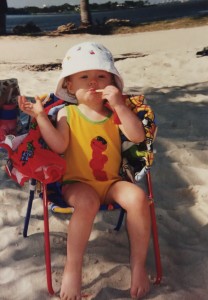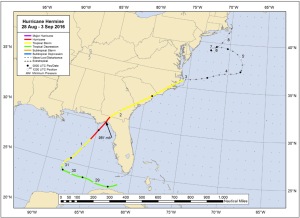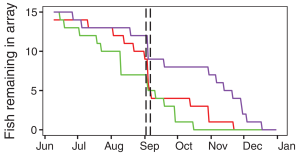On Monday April 16th I sued Florida Governor Rick Scott and the State of Florida (click here to read the lawsuit) along with seven brave children from all over the state to demand that the promises made to us in the Florida Constitution and The Public Trust Doctrine be kept and that our Public Trust Resources including our atmosphere and waters be protected from man-made carbon dioxide pollution caused by fossil fuels. Here are some of the reasons why I feel that we have a moral obligation to try and change things before it’s too late and, therefore, why I’ve sued our State and Governor.
I am the fourth generation of my family to live in South Florida and was born here in Miami. I love the state of Florida and its incredible diversity including the vibrancy and natural beauty of Miami and Miami Beach, the serenity of places like Matheson Hammock, and natural wonders such as the Florida Keys, our state’s amazing coral reefs and, of course, the Everglades, the only habitat of its kind on earth.
But I am deeply worried about Florida’s future. The carbon dioxide that is being pumped into our atmosphere and oceans from petroleum products made from fossil fuels place parts of Florida that I cherish at the very real risk of disappearing.
Of becoming extinct.
Of being lost.
Forever.
And those concerns, along with our State leaders total disregard for what is already happening, much less the threats that we face in the future, is part of the reason that I am suing our Governor and State of Florida. Our climate change crisis is the biggest issue that my generation will ever face and it’s up to us, today’s children, to fix this problem. It is my hope that the court will rule to require that Florida enact and enforce laws to reduce and eliminate carbon emissions so that our state and citizens can have a future here.
I cherish my family home on No Name Key in the Florida Keys in Monroe County, an island that’s in the National Key Deer Refuge and the Great White Heron National Wildlife Refuge. No Name Key is filled with amazing, magical, creatures like the tiny Key Deer who make their home there but in a County whose average elevation above sea level is less than 6 feet, I wonder and worry about whether the Florida Keys, and my home, the deer and their habitat will survive a future where seas are projected to rise between at least two and six feet, or more, unless we take action now.
But when I wrote to the State of Florida’s Department of Environmental Resources to ask what they are doing about our climate change crisis and my sea level rise concerns and our overall region their response upsets and scares me. Here’s what they wrote in response:
To Delaney Reynolds;
Unfortunately the response to both of these questions is “Not much”. The Governor has not supported climate related legislation and as a result not much is getting done at the State level.
Sr. Administrator / Department of Environmental Resources,
State of Florida
That response, the state’s “not much” response, is unacceptable and is another reason why I am suing Governor Scott and the State of Florida.

This is me at 2 years of age at Matheson Hammock Beach. Unless we take action now, future generations will not be able to enjoy this special place like I did.
And speaking of special places, Matheson Hammock is a wonderful public park that’s a short walk from my Miami home. It has an incredible path that winds its way through miles of mangrove forests as well as a marina and beach with a salt water swimming hole that overlooks downtown Miami and the ocean beyond. It’s a place that generations of South Floridians have enjoyed, a place where I learned to swim and where my father before me did too.
But it breaks my heart to see sea level rise covering the park’s paths, roads and beaches more each year and to know that someday soon, unless the State of Florida takes action to protect us, Matheson Hammock and places all over Florida like it will forever disappear. And that’s a tragedy that we cannot tolerate and yet another reason why I am suing the Governor and State.
Communities large and small all over Florida are already being forced to take action to address our climate crisis and when it comes to sea level rise, South Florida is literally ground zero for what’s happening here in the United States. Billions of dollars of real estate, as well as the tax revenue that goes with it is at risk. Millions of people face the very real risk of being forced from our region and becoming climate change refugees. Much of our environment is literally at risk of extinction and yet our state’s political leaders avoid and deny the reality that our citizens increasingly face and leave it to locals to try and address this enormous issue. Examples include:
1. Miami Beach is spending nearly half a billion dollars to begin addressing the flooding from sea level rise that already consumes their community.
2. Last year City of Miami voters passed the Miami Forever Bond including $200 million towards sea level rise mitigation. Of course they did, flooding from seal rise has become a way of life here.
3. The City of South Miami passed a historic solar power law last year, the first of its type in Florida, a law that I proudly played a role in conceiving and helped to write, that requires residential solar power as a step to reduce carbon emissions.
4. Miami-Dade, Broward, Monroe and Palm Beach Counties have banded together to create the South Florida Climate Change Compact because of the dire risks that our entire region faces.
In each of these cases concerned citizens and local leaders have come to realize that we must take action if South Florida is to have a chance to have a future. And yet, Florida’s Governor mocks us by denying that human caused climate change and sea level rise is an issue by saying that he has no view on these topics because, as he likes to say, he’s “not a scientist”.
Well, most of the people in our region are not scientists, but they do have eyes and can see that the water and temperature are rising, and that climate change is already affecting their ability to live a happy life here. The science and facts related to human induced climate change and sea level rise are indisputable and you do not need to be a scientist to see this and, thus, another reason I am suing is to help those communities, and the people who live in them, all over Florida that are desperately fighting our climate crisis without help from the Governor or State of Florida.
And I am suing the State and Governor on behalf of those who can’t but will be highly impacted by this growing catastrophe including:
1. Our natural environment and the unique habitats and creatures that will be lost or displaced without action. Take, for example, a place that’s hidden from most people’s view, our underwater environment including the Florida Reef Track, a 360-mile-long ancient coral reef that runs from the St. Lucie Inlet in Martin County to the Dry Tortugas National Park, West of the Florida Keys. It’s the third largest reef in the world and home to millions of marine animals but it IS at risk of extinction from ocean acidification caused by man-made carbon dioxide from fossil fuels. Why would any of us allow that to happen?
2. Millions of people who face a future where they are at risk of becoming climate refuges unless we take action. People who will be forced to move from places they love and, in many cases, where their forefathers have lived for generations.
3. And people whose health will be severely impacted, especially the youngest and oldest in our society, as temperatures continue to climb.
4. And people too young to speak out today, as well as those not yet born but who have the undeniable right to enjoy a safe, clean, natural environment. A right that the State and our Governor are stealing from all of us by not taking action before it’s too late.
The good news is that there are solutions and the sooner we begin widely implementing them the better chance we have to save Florida and the less costly it will be to fix the problem. The bad news is that the State of Florida and our Governor have done little to nothing to begin solving the problem and that’s another reason why I am suing.
For example, experts predict that solar power can produce HALF of Florida’s energy needs by the time I’m 45 years or so old if our State would just become serious about sustainable energy and stop playing politics by protecting the established, polluting power companies. My local power company in Miami, Florida Power & Light, has been in business for nearly 100 years in a place nicknamed ‘The Sunshine State” yet produces less than half of 1% of its power from solar. Now that makes NO sense.
For a Governor who likes to campaign for office by touting job creation it also makes no sense that he’s not embraced growing solar power for Florida. Experts predict that transitioning Florida to a renewable energy system would create over 300,000 good, well paying, long term jobs.
And, of course, let’s not forget that widely expanding solar power everywhere will save consumers a LOT of money while also helping save our environment.
So, while the Governor and State of Florida appear dedicated to the polluting ways of the past, I am hoping that our future will be filled with sustainable power and that The Sunshine State will become THE Solar State.
Allow me to end by sharing how much I enjoyed Ms. Hamann’s Civics & History class in 8th Grade. Not only was she incredibly engaging, entertaining and nice, but I learned many important lessons from her about the three branches of our government:
1. The Executive branch where our Governor and his Cabinet are located,
2. The Legislative branch where Representatives and Senators serve,
3. And the Judicial branch where our state’s legal system operates to help protect us.
I am suing the State and our Governor because the Executive and Legislative branches have miserably failed to protect us and our environment from the climate change crisis. They have failed to honor their legal duties in the Florida Constitution and The Public Trust Doctrine by not protecting our Public Trust Resources and it is my hope that the Court will:
1. Affirm that our atmosphere is a Public Trust Resource,
2. Rule that the State has a fiduciary responsibility to protect our atmosphere, waters, land, marine resources, beaches and other Public Trust Resources from waste,
3. Affirm that the State has breached its responsibility to reduce Florida’s carbon emissions,
4. Rule that the State be forced to prepare and implement a remediation plan, and
5. Require the State to create the laws necessary to enact that plan so as to reduce Florida’s carbon emissions to safe levels that are based on scientific facts
As stewards of our state I believe that we have a moral obligation to solve our climate crisis and it is my hope that our legal system will help me draw a line in the sand so as to stop the damage and begin implementing solutions while Florida’s beaches still have sand on them.
Before it’s too late.
I want to end this blog post by congratulating my co-Plaintiffs, the seven children that are standing with me to fight our Governor and the State. Thanks to Levi, Isaac, Luxha, Andres, Oscar, Oliver and Valholly. You are brave and passionate beyond words and I know that I speak for countless people when I say how grateful I am for your commitment and passion to helping me solve our climate change crisis.
I also want to end by thanking our exceptional legal team, our attorneys, as well as the incredible team at Our Children’s Trust for all your help. On behalf of all the children, and the generations that will come after us, thanks to Guy Burns, Andrea Rodgers, Meg Ward, Caitlin Howard, Dick Jacobs, Mitchell Chester, Sandy D’Alemberte, Wally Pope, Jane West, Erin Deady, Deb Swim, and Matthew Schultz.
To learn more about the lawsuit and the organization helping Florida’s children seek justice, please visit Our Children’s Trust by clicking here or Youth V. Gov by clicking here.



